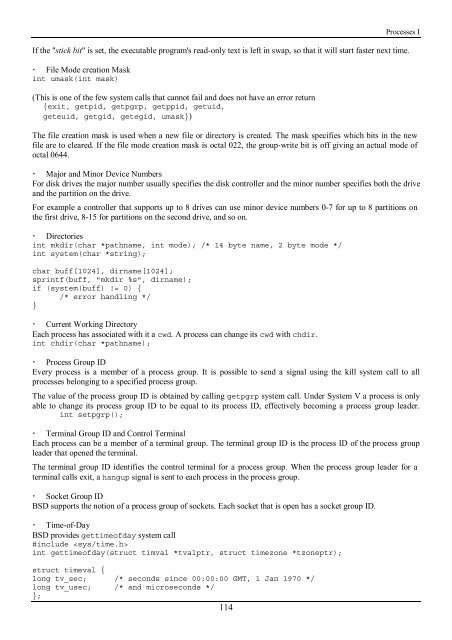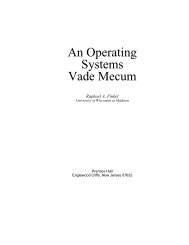You also want an ePaper? Increase the reach of your titles
YUMPU automatically turns print PDFs into web optimized ePapers that Google loves.
struct timeval {<br />
long tv_sec; /* seconds since 00:00:00 GMT, 1 Jan 1970 */<br />
long tv_usec; /* and microseconds */<br />
};<br />
114<br />
Processes I<br />
If <strong>the</strong> "stick bit" is set, <strong>the</strong> executable program's read-only text is left in swap, so that it will start faster next time.<br />
! File Mode creation Mask<br />
int umask(int mask)<br />
(This is one of <strong>the</strong> few system calls that cannot fail and does not have an error return<br />
{exit, getpid, getpgrp, getppid, getuid,<br />
geteuid, getgid, getegid, umask})<br />
The file creation mask is used when a new file or directory is created. The mask specifies which bits in <strong>the</strong> new<br />
file are to cleared. If <strong>the</strong> file mode creation mask is octal 022, <strong>the</strong> group-write bit is off giving an actual mode of<br />
octal 0644.<br />
! Major and Minor Device Numbers<br />
For disk drives <strong>the</strong> major number usually specifies <strong>the</strong> disk controller and <strong>the</strong> minor number specifies both <strong>the</strong> drive<br />
and <strong>the</strong> partition on <strong>the</strong> drive.<br />
For example a controller that supports up to 8 drives can use minor device numbers 0-7 for up to 8 partitions on<br />
<strong>the</strong> first drive, 8-15 for partitions on <strong>the</strong> second drive, and so on.<br />
! Directories<br />
int mkdir(char *pathname, int mode); /* 14 byte name, 2 byte mode */<br />
int system(char *string);<br />
char buff[1024], dirname[1024];<br />
sprintf(buff, "mkdir %s", dirname);<br />
if (system(buff) != 0) {<br />
/* error handling */<br />
}<br />
! Current <strong>Working</strong> Directory<br />
Each process has associated <strong>with</strong> it a cwd. A process can change its cwd <strong>with</strong> chdir.<br />
int chdir(char *pathname);<br />
! Process Group ID<br />
Every process is a member of a process group. It is possible to send a signal using <strong>the</strong> kill system call to all<br />
processes belonging to a specified process group.<br />
The value of <strong>the</strong> process group ID is obtained by calling getpgrp system call. Under System V a process is only<br />
able to change its process group ID to be equal to its process ID, effectively becoming a process group leader.<br />
int setpgrp();<br />
! Terminal Group ID and Control Terminal<br />
Each process can be a member of a terminal group. The terminal group ID is <strong>the</strong> process ID of <strong>the</strong> process group<br />
leader that opened <strong>the</strong> terminal.<br />
The terminal group ID identifies <strong>the</strong> control terminal for a process group. When <strong>the</strong> process group leader for a<br />
terminal calls exit, a hangup signal is sent to each process in <strong>the</strong> process group.<br />
! Socket Group ID<br />
BSD supports <strong>the</strong> notion of a process group of sockets. Each socket that is open has a socket group ID.<br />
! Time-of-Day<br />
BSD provides gettimeofday system call<br />
#include <br />
int gettimeofday(struct timval *tvalptr, struct timezone *tzoneptr);
















